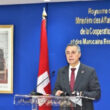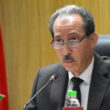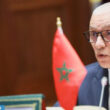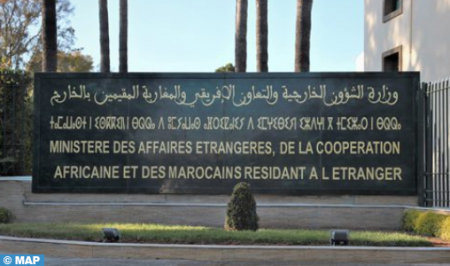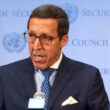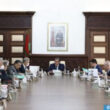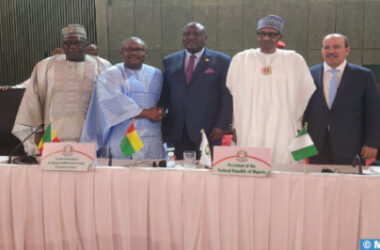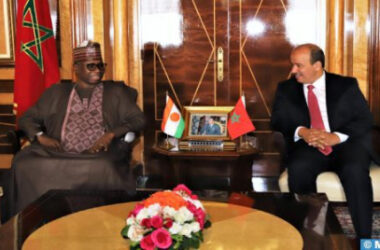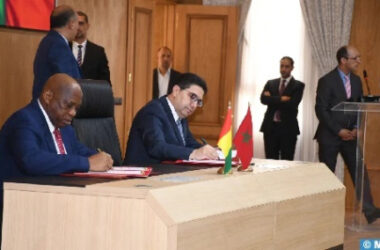“The adoption of this resolution comes in a context marked by the significant breakthroughs achieved, under the leadership of His Majesty King Mohammed VI, may God assist Him, in this issue in recent years,” the ministry said in a statement, following the adoption by the UN Security Council of the Resolution 2654 on the question of the Moroccan Sahara.
The ministry says, in this sense, that the growing international support of important and influential countries to the Moroccan autonomy initiative, the opening in Laayoune and Dakhla of more than thirty Consulates General, the non-recognition of more than 84% of UN member states of the puppet entity, as well as the economic and social development in the southern provinces, are all illustrations of this highly positive dynamic.
“Today, the new resolution, while enshrining the previous achievements of Morocco, is a resolution of confirmation and evolution,” says the ministry, adding that it is a confirmation resolution that reaffirms the framework of the political process, its actors and its purpose.
It is first, argues the statement, a confirmation of the framework of the political process, since the Security Council considered (in the preambular paragraph No. 4 of the resolution) that the format of “round tables” is the only framework for discussion to achieve a final solution to the regional dispute over the Moroccan Sahara.
The resolution also mandated (in its operative paragraph No. 3) the Personal Envoy of the UN Secretary-General to “facilitate” the political process by “building on … the framework established by the former Personal Envoy”, namely the two “round tables” held in Geneva in December 2018 and March 2019 respectively, the same source notes.
It is then a confirmation of the actors of the political process, which assume a legal, political and moral responsibility in the search for the solution. Thus, the resolution called on again (in its operative paragraph No. 3) “Morocco, Algeria, Mauritania and +polisario+ to remain committed to this process throughout its duration, in a spirit of realism and compromise, in order to make it succeed”, stresses the statement.
“It is noted that the resolution systematically cites Algeria whenever there is a reference to Morocco,” the same source says.
The resolution is a confirmation of the finality of the political process, since the resolution reiterated (in its operative paragraph No. 2) that the political solution should be “realistic, pragmatic, sustainable and based on compromise”, which can only be the Moroccan Autonomy Initiative, whose pre-eminence was again reaffirmed by the Security Council, explains the statement.
In addition, and while being a resolution of confirmation, the text adopted today has enshrined important developments at least at two levels, that of the census and registration of the population of the Tindouf camps on the one hand, and that of respect for the mandate of MINURSO in monitoring the ceasefire, on the other.
In fact, the Ministry details, the Security Council has (in preambular paragraph 23) “urged again” Algeria that the populations of the Tindouf camps “be duly registered, and stressing the importance that all necessary measures be taken to this end.” The same request was addressed (in operative paragraph 15) to the United Nations’ agencies to observe the “best practices” of the UN in the delivery of humanitarian aid to the populations of the camps.
The Council thus confirmed the concerns of the international community regarding the systematic embezzlement of humanitarian aid for these populations, duly documented in reports of international organizations, says the Ministry.
The same source adds that the resolution (in its operative paragraph No. 8) expressly requested the “polisario” to allow the resumption of the safe and regular resupply of MINURSO in order to ensure the sustainability of the presence of the Mission.
Thus, the Security Council denounced the continued violations by “polisario” of the ceasefire in the east of the Moroccan defense system, in contrast to the constant cooperation of the Kingdom with the UN Mission.
“Ultimately, and strengthened by its achievements and this constant line taken by the Security Council, the Kingdom of Morocco, as reaffirmed by His Majesty King Mohammed VI, may God assist Him, remains fully committed to support the efforts of the UN Secretary-General and his Personal Envoy aimed at the relaunching of the roundtable process, with a view to achieving a political solution, based on the Moroccan Autonomy Initiative, and in strict compliance with the territorial integrity and national sovereignty of the Kingdom,” the statement concludes.


